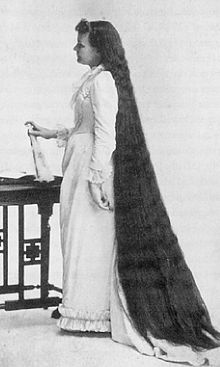
Quick Facts
Biography
Martha Matilda Harper (September 10, 1857, Oakville, Ontario – August 3, 1950, Rochester, New York) was a Canadian-American businesswoman, entrepreneur, and inventor who built an international network of franchised hair salons that emphasized healthy hair care. Born in Canada, Harper was sent away by her father when she was seven to work as a domestic servant. She worked in that profession for 25 years before she saved enough money to start working full-time producing a hair tonic she invented. The product, and the creation of special hair salons that utilized it, was successful. Harper began franchising the salon model to low-income women, and by its peak the company included more than 500 franchises and an entire line of hair care products.
Early years
Born in Oakville, Ontario, Canada, Harper's father sent her away at age seven to become a domestic servant for relatives in Orno, Ontario. She worked in that profession for 22 years before moving to the United States to work as a servant in Rochester, New York. Her last Canadian employer, a physician, had imparted his knowledge of hair health to her, and bequeathed her his hair tonic formula when he died. While a servant, Harper developed her own hair tonic after becoming concerned that the hair products on the market did more harm than good. She saved enough money to begin producing the hair tonic full-time, and, upon leaving domestic service three years after her immigration to the United States, opened the first public hair salon in the region in order to help market it. Her salon opened in 1888 in Rochester using her life savings of $360.
Company
Harper’s salon The Harper Hair Parlour, and many of her innovations, including the Harper Method, underlie the modern concept of the hair salon. Her floor-length hair also served as an effective marketing tool and appeared in many advertisements for her products. In 1891, she became one of the first businesspeople in America to start franchising, allowing franchisees to open salons under the Harper name. She would train the franchisees and inspect their salons to ensure quality.
Emphasizing customer service and comfort, Harper invented reclining shampoo chairs, which became a common feature of salons worldwide. The salons offered scalp massage and child care, and they provided evening hours. The hair products her company produced were intended to be healthier than those widely available at the time and were made largely with natural products. Harper salons did not carry synthetic dyes or do chemical perms.
Famous clientele
At the height of its success, her company had 500 franchises and produced a full line of hair care and beauty products. Among the Harper customers were Susan B. Anthony, Woodrow Wilson, Grace Coolidge, and Jacqueline Kennedy.
Company Legacy

The Harper Method Inc. has operated under a variety of different owners. In June 1956, Robert McBain, Harper's husband, sold the enterprise to Earl Freese and Gerald Wunderlich who then made three different attempts to sell the business throughout the 1960s and 70s.
“In 1971, Robert Prentices, then manager of the Harper manufacturing centre in St. Catharine’s, Ontario, purchased the factory assets along with Harper manufacturing and distribution rights, renaming the company Niagara Mist Marketing Ltd, also known as The Soap Factory.
On March 10, 1972, other Harper Method Inc., assets were bought by PEJ Beauty Corporation, a wholly owned subsidiary of the Wilfred Academy. At the time, PEJ was one of the largest operators of trade schools in America. According to Philip Jakeway, then President of the Wilfred Academy, he hoped to expand his operation by marketing the Harper products and shops. An agreement was reached whereby Prentice would supply Harper products to Jakeway for U.S. distribution.Jakeway was unsuccessful.”
As for The Harper Method Founder’s Shop, it operated in Rochester, New York, as the country’s oldest, and longest running, beauty shop until the early 2000s. It was the last Harper shop to remain open.
Death and Legacy
Martha died on August 3, 1950, one month short of her 93rd birthday, survived by her husband Robert MacBain, who later died on April 30, 1965, at the age of 83.
In 2003, Harper was inducted into the National Women's Hall of Fame for her achievements in business.
